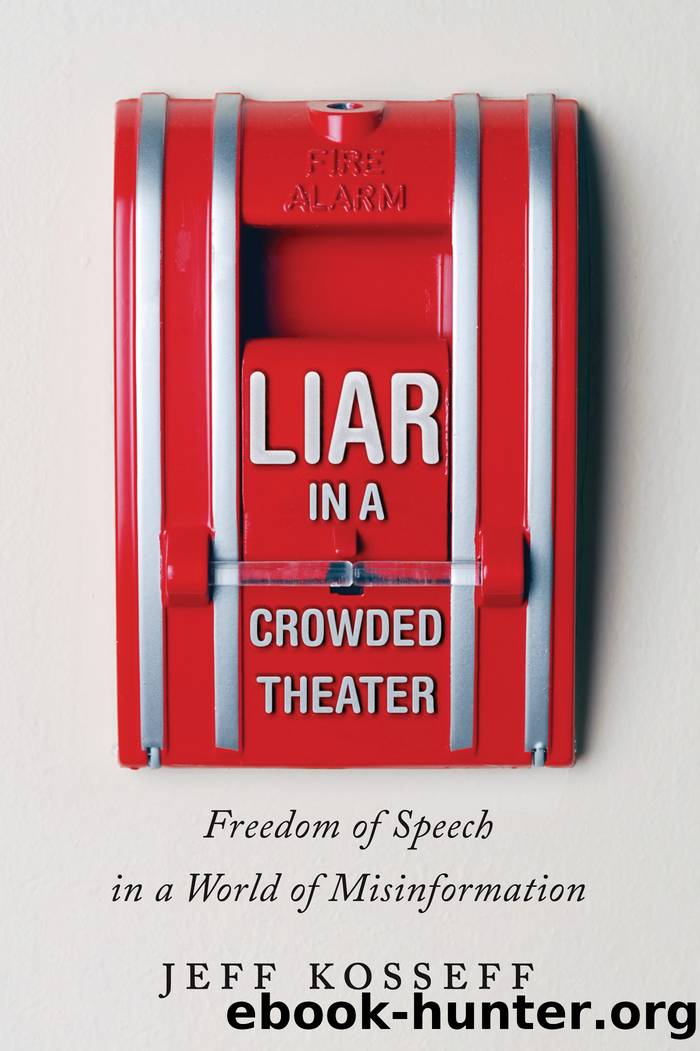Liar in a Crowded Theater by Jeff Kosseff

Author:Jeff Kosseff
Language: eng
Format: epub
Publisher: Johns Hopkins University Press
Published: 2023-11-15T00:00:00+00:00
Chapter 11When Regulation or Liability Might Be an Answer
Until this point in the book, I have mainly discussed legal claims that have failed in the face of strong legal protections for false speech. Indeed, the protections for false speech in the United States are far greater than they are in most other parts of the world. But US law does not protect all false speech.
As Justice Anthony Kennedy wrote in the United States v. Alvarez plurality opinion, in which he rejected a categorical rule that false speech is unprotected, â[s]ome false speech may be prohibited even if analogous true speech could not be.â1 Examples of permissible regulations of false speech, Kennedy wrote, include defamation lawsuits, prohibiting false statements to federal officials, perjury laws, and impersonating government officers. âThis opinion does not imply that any of these targeted prohibitions are somehow vulnerable,â Kennedy wrote. âBut it also rejects the notion that false speech should be in a general category that is presumptively unprotected.â2 This chapter examines the cases in which speakers can be held legally accountable for their false statements, both through existing laws such as defamation and new avenues that reflect the First Amendment principles outlined in this book.
Defamation law allows subjects of some particularly harmful and targeted misinformation campaigns to attempt to hold the speakers accountable, despite the high bar set by the actual malice requirement of New York Times v. Sullivan, the burden shifting of Philadelphia Newspapers v. Hepps, the fair report privilege, and other protections. Among the most prominent uses of defamation lawsuits to address modern falsehoods arose from commentary and media coverage of claims by President Donald Trump and his allies that Smartmatic and Dominion Votingâtwo companies that provide many jurisdictions nationwide with voting technologyâwere part of broader election fraud that threw the election to Joe Biden. As of March 2022, the two companies had filed 12 lawsuits against Trump-friendly media outlets and allies of Trump who allegedly spread lies about the companiesâ actions in the 2020 elections.3 And at least in some cases in which judges had issued early rulings, the many First Amendment, common-law, and statutory protections did not appear to be a substantial barrier.
One such high-profile example is the lawsuit that Dominion filed against Fox News Network in March 2021, in Delaware state court. A frequent guest on Fox in the weeks after the election was lawyer Sidney Powell, who had filed lawsuits challenging the election results. On November 8, 2020âa day after Fox projected that Biden had defeated TrumpâPowell told Fox host Maria Bartiromo that there was âa massive and coordinated effort to steal this election from We the People of the United States of America, to delegitimize and destroy votes for Donald Trump, to manufacture votes for Joe Biden.â
âSidney, we talked about the Dominion software,â Bartiromo said. âI know that there were voting irregularities. Tell me about that.â
âThatâs putting it mildly,â Powell responded. âThat is where the fraud took place, where they were flipping votes in the computer system or adding votes that did not exist.
Download
This site does not store any files on its server. We only index and link to content provided by other sites. Please contact the content providers to delete copyright contents if any and email us, we'll remove relevant links or contents immediately.
The Secret History by Donna Tartt(19088)
The Social Justice Warrior Handbook by Lisa De Pasquale(12190)
Thirteen Reasons Why by Jay Asher(8909)
This Is How You Lose Her by Junot Diaz(6886)
Weapons of Math Destruction by Cathy O'Neil(6279)
Zero to One by Peter Thiel(5801)
Beartown by Fredrik Backman(5754)
The Myth of the Strong Leader by Archie Brown(5507)
The Fire Next Time by James Baldwin(5444)
How Democracies Die by Steven Levitsky & Daniel Ziblatt(5218)
Promise Me, Dad by Joe Biden(5153)
Stone's Rules by Roger Stone(5087)
A Higher Loyalty: Truth, Lies, and Leadership by James Comey(4963)
100 Deadly Skills by Clint Emerson(4925)
Rise and Kill First by Ronen Bergman(4788)
Secrecy World by Jake Bernstein(4753)
The David Icke Guide to the Global Conspiracy (and how to end it) by David Icke(4718)
The Farm by Tom Rob Smith(4509)
The Doomsday Machine by Daniel Ellsberg(4490)
